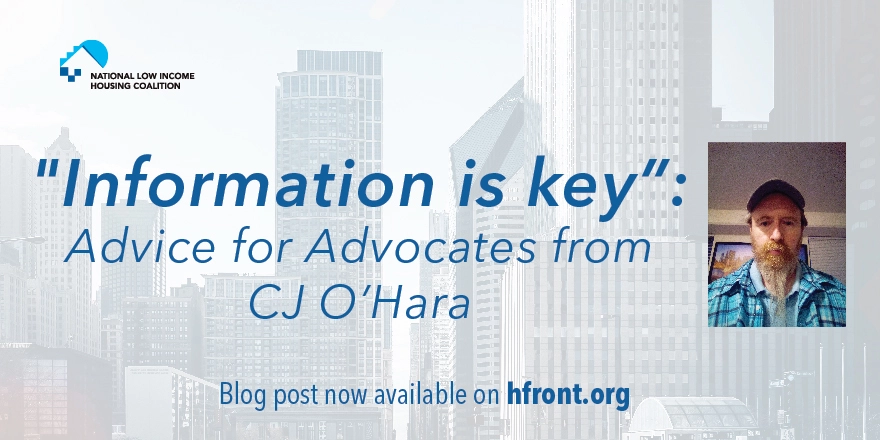CJ O’Hara is a homeless and housing advocate based in Chicago. In 2014, CJ became homeless. While trying to find a place to stay, he learned about the programs designed to help people experiencing homelessness and housing insecurity, as well as the barriers that exist in some of these programs. In 2015, he began his tenant advocacy work by becoming active in several different groups and cohorts that aimed to address the problems in homeless services, rental assistance, and affordable housing programs.
CJ co-chairs Chicago’s Continuum of Care lived experience commission and is board chair of suburban Cook County’s Continuum of Care’s lived experience group, which he helped create. In addition to being part of lived experience groups, he is involved with the Homeless Task Force of Legal Aid Chicago, where he helps with intake and sits on the board. CJ is also part of the Chicago Homelessness and Health Response Group for Equity (CHHRGE), which is made up of tenants, housing providers, legal aid providers, service providers, and other stakeholders and advocates involved in the fight for affordable housing. The group tries to figure out how to handle crisis situations while still delivering quality services, including by thinking outside the box about what to do when shelters are packed and by advocating to elected officials. And CJ’s work as an advocate goes even further: during the pandemic, he developed an interest in international housing issues, and he also became involved in groups working on water access and transit equity.
Given his extensive experience, CJ has some good advice for those just getting started in housing advocacy.
“When you don’t have money or influence, information is key. Your voice can only go so far. Information barriers are real, but it’s good to have a network to learn about and share resources. Take on what you can. If it becomes too much, lay back if you need to but don’t burn out and disengage. Try to make sure that you know things are available. Don’t be afraid to ask questions. When you’re in a meeting, make sure you are present, make sure you are paying attention. Find what works for you. Don’t be afraid to challenge in a respectful way. You might get pushback from people who think you shouldn’t be asking questions – some people in positions of authority don’t like to be questioned. If you don’t start the conversation, things can be disjointed or disconnected. Not everything needs to be in person. Hybrid meetings can work. Meaningful input is important either way. Make sure you do what you can – ups and downs will happen.”
CJ also stresses the importance of knowing your voting rights and making sure you are registered to vote. Likewise, he urges advocates to see their local public housing authority as a resource for information, and he reminds advocates that because most housing authority board meetings are public, anybody has the opportunity to speak during these meetings, and you don’t even have to live in a housing authority-managed building. Lastly, he reminds advocates of the importance of adopting a holistic approach to advocacy and being sure to find time away from work, as well as being mindful about reducing screen time and getting enough rest and sleep.



Leave a comment